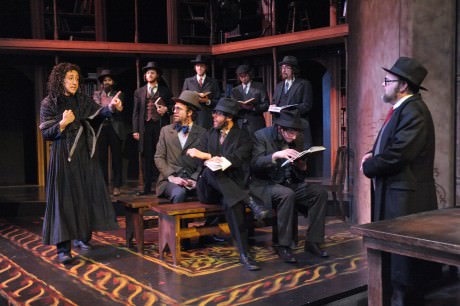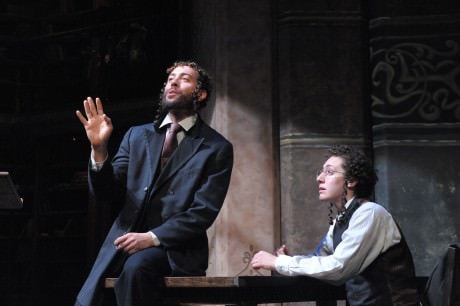In Theater J’s beautiful, eloquent, and thrilling new production of Yentl, such profound new life has been breathed into Isaac Bashevis Singer’s beloved novella that at its heart this retelling is more transformative than any before. By that I mean: Inside this thoroughly charming show is an interpretation so disarming that it’s not only (in Artistic Director Ari Roth’s words) “a Yentl for our time“; it’s ultimately a Yentl for the future of who we are.

Anshul (the male name and persona young Yentl has adopted in order to study Torah) tips us off to what’s up at the beginning: “This is a story about the mystery of appearances, the deceptions of the heart, and the divine androgyny of the soul.” And it’s that last part, “the divine androgyny of the soul,” that this production keeps gently assisting us to glimpse.
To be sure, the familiar feminist framing of the fable is still intact: a young woman’s resistance to society’s diminishing and demeaning expectations for her under male-supremacist hegemony. This was the paradigmatic theme that resonated in 1975 when the women’s movement was taking off and the stage adaptation by Leah Napolin and Isaac Bashevis Singer opened to acclaim on Broadway. The handsomely masculine set designed by Robbie Hayes, with lighting designed by Andrew Cissna, is a two-level library loaded with books on shelves literally bookended by a proscenium erected of massive tomes. As the audience enters, seven young yeshiva students are discussing and reading. It’s nothing like the neutral, bare, white-walled and white-floored space the play took place in 39 years ago. This Yentl never lets us forget its oppressive context: a men’s world of learning from which women are forbidden—”as it is written.”
As musicians appear, the wonderful klezmer/pop/rock score composed for Napolin and Singer’s play by Jill Sobule begins. Then a mixed-gender chorus of townspeople starts to sing. Each member of the cast is a splendid singer, the musicians among them are superb, and Music Director Jonathan Tuzman has conducted them all gorgeously. But this is not a musical as such, not even a play with music exactly, because the lyrics enhance and comment on the period narrative in a completely contemporary voice—which has the marvelous effect of keeping us in mind of the story’s relevance right now.
Three characters carry the play’s plot. As Anshul/Yentl, the girl who dresses as a boy, Shayna Blass embodies a young person’s passion kept within impossible constraint. As Avigdor, Anshul’s study partner at the yeshiva, Michael Kevin Darnall portrays overt passions with more amplitude, as befits the liberty of a young man, yet his complex inner emotional life is always transparent. As the ingenue Hadass, Avigdor’s beautiful former fiancé, Sara Dabney Tisdale is as winsomely rebellious yet conforming as any modern teenage girl. Theater J Associate Artistic Director Shirley Serotsky, whose insightful staging reveals rich layers of meaning and feeling throughout, has paid particularly illuminating attention to the polyamorous love triangle that plays out among them.
Anshul has feelings for Avigdor (as a female might have for a male), who also has feelings for Anshul (more complicatedly as a male for a male). Referring to this mutual yet suppressed attraction, the witty lyrics of one of the songs, based on the Biblical love of Jonathan and David, say “They were really close—if you know what I mean.”)
Meanwhile Avigdor longs for Hadass, who unwillingly cut off their engagement because her mean mother said. So Anshul, out of love for Avigdor, vows to get Avigdor and Hadass back together again. Except, oopsie, Hadass falls in love with Anshul. And Anshul comes to love Hadass. Oy.
“We’re in this together, the three of us,” says Avigdor to Anshul at one point. And later, after Yentl reveals herself to be a woman, and Avigdor and Hadass do get back together—with Anshul/Yentl having devotedly served as their matchmaker after all—Avigdor tells Hadass, “She [Yentl] loved us both.” It is one of the tenderest and truest moments in a play that is brimming with them.
Some current commentary on this musicalized version of Yentl speaks of it as “a transgender story” (as NPR called it), so I went prepared to view it through that trendy lens. But with respect to the contemporary transgender community, I think that’s not what’s going on here. I think Yentl as reconceived at Theater J has really and deeply become a story about the divine androgyny of the soul, just as Anshul says up top. It’s not about a sex change; it’s about a heart change.
In the English translation of Singer’s “Yentl, the Yeshiva Boy” I read before attending the play, the gender of the pronoun for Anshul/Yentl keeps going back and forth without explanation; it just shifts fluidly, almost arbitrarily (though never confusingly). That’s a very literary way of evoking the divine androgyny of the soul. But how to make such an ephemeral and elusive notion come alive on stage dramatically so we can behold it in moment-to-moment reality?
At its core, more than the story of a girl in conflict with an exclusionary men’s world, this Theater J production reveals Yentl to be the story of someone in conflict with the gender binary itself. The foregrounding of the love triangle, and its stunningly heartfelt execution, is the giveaway.

At the end, when Avigdor and Hadass marry, and Yentl, who loved them both, watches from a perch on the second tier of the library, we get a happy ending for the newlyweds. But what does Yentl get? Is it an unhappy ending, or bittersweet? Or is it the wisdom she sought in the Torah that she finally finds in her own living and loving?
You will not leave this great production of Yentl unmoved and untouched. You may also catch a glimpse of the divine.
Running Time: Approximately two and a half hours, with one 15-minute intermission.
Yentl plays through October 5, 2014 at Theater J at The Washington DCJCC’s Aaron & Cecile Goldman Theater- 1529 16th Street, NW, (16th and Q Streets), in Washington, DC. For tickets, call the box office at (800) 494-8497, or purchase them online.





what a very welcome balance to Peter Marks’ review in the Washington Post. I am sure all those involved with the play will be very happy. I, for one, am looking forward to seeing a performance and hope others will be at Theater J, as well.